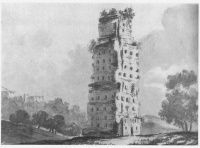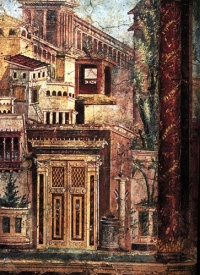Pompeii
From The Art and Popular Culture Encyclopedia
.jpg)
|
"Classical archaeology the excavation and analysis of ancient Greek and Roman sites was born on Wednesday, October 22, 1738. It was on that day, a Wednesday, that an engineer in the army of the Bourbon royal family in Naples, named Roque Joaquín de Alcubierre (1702-1780), had himself lowered by ropes, down a great square well shaft, cut through volcanic material that had formed on the great volcano."--Sholem Stein "At length, in 1748, in the reign of Charles III, the first Bourbon king of Naples, a Spanish colonel of engineers, named Don Rocco Alcubierre, was employed to examine the subterranean canal before mentioned; and having heard from the inhabitants of Torre Annunziata that the remains of a house, with ancient statues and other objects, had been discovered at a distance of about two miles, he was led to conjecture that some ancient city lay buried there, overwhelmed by the great eruption of Vesuvius in 79. The discovery of Herculaneum early in the 18th century had now drawn the attention of the learned and scientific world to this subject. Colonel Alcubierre obtained permission to undertake some excavations at the spot where the ruined house had been discovered, and early in April, 1748, he commenced his researches, in the street afterwards called the Strada della Fortuna."--Pompeii, its History, Buildings and Antiquities (1867) by Thomas Henry Dyer |

|
Related e |
|
Featured: |
Pompeii was an ancient city in what is now the comune of Pompei, near Naples in Italy. Along with Herculaneum, Stabiae, and many surrounding villas, the city was buried under 4 to 6 m of volcanic ash and pumice in the eruption of Mount Vesuvius in 79 AD.
The city was lost for 1,600 years before its accidental rediscovery in 1748. Since then, its excavation has provided an extraordinarily detailed insight into the life of a city at the height of the Roman Empire. Today, it is one of the most popular tourist attractions of Italy and a UNESCO World Heritage Site.
See also
- Cities buried by volcanic eruptions
- Pompeii: The Last Day
- Aqua Augusta (Naples)
- Roman aqueducts
- Erotic art in Pompeii and Herculaneum
- Excavations of Pompeii, Herculaneum, and Stabiae
- The Fires of Pompeii
- House of the Faun
- House of the Vettii
- Villa of the Mysteries
- Mount Pelée (similar destructive eruption at Martinique in 1902)
- House of Julia Felix
- Robert Rive, 1850s photographer of Pompeii


